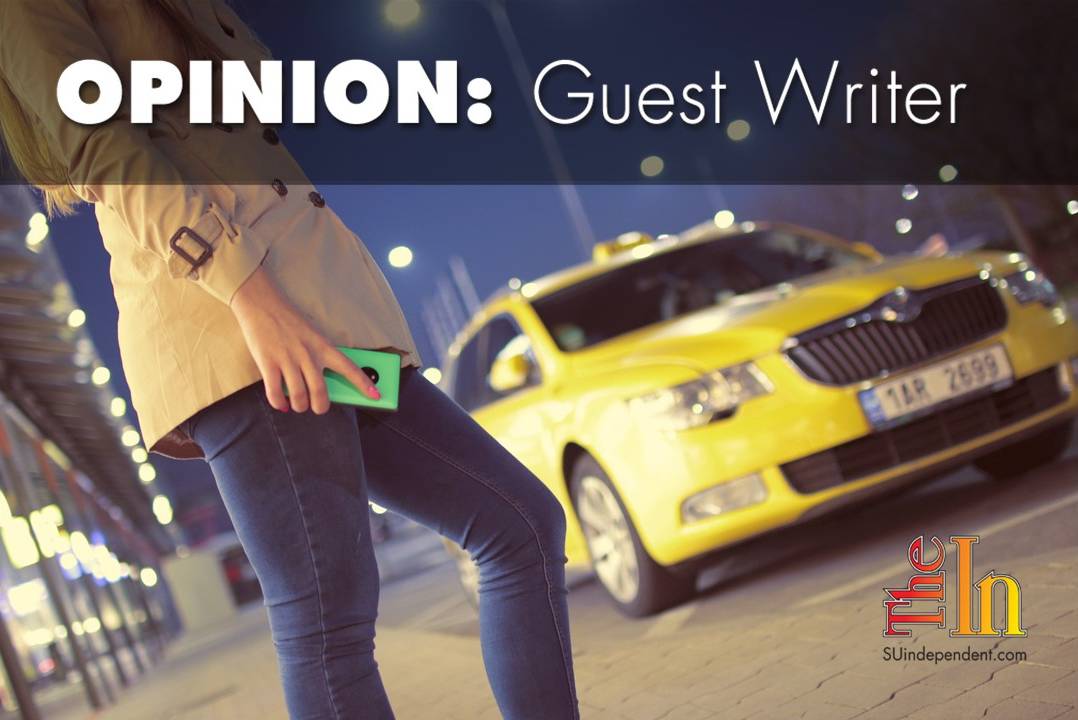 On a recent Uber ride through the streets of Las Vegas, our female driver told us about the harassment she endured during her last clients, a group of four drunk men who spent the entire trip offering her money to take her top off.
On a recent Uber ride through the streets of Las Vegas, our female driver told us about the harassment she endured during her last clients, a group of four drunk men who spent the entire trip offering her money to take her top off.
As we exited the vehicle, my (male) friend, also an Uber driver, said, “I always worry about things like that for female drivers. Women just shouldn’t be able to drive for Uber. That’s the only way to guarantee that they’re safe.”
Before I go on, please note that I consider this male friend to be a thoughtful, intelligent person who respects women. But even from someone as smart as him, I get frustrated when I hear this type of logic. Why is the immediate solution that the female driver should be out of a job? Why isn’t there an avenue for her to report harassment from passengers and make sure those guys are never allowed in an Uber again?
 The solution of not letting women drive for Uber hides the symptom of a problem as opposed to eradicating the problem itself: that those men felt entitled to treat the driver like a sex worker and that she simply had to accept it if she wanted the fare. Removing her from her position so that men won’t harass her is akin having a dentist remove all your teeth so you never have to worry about cavities. There has to be a better way. What we really need is a reframing of what protecting anyone of either sex looks like.
The solution of not letting women drive for Uber hides the symptom of a problem as opposed to eradicating the problem itself: that those men felt entitled to treat the driver like a sex worker and that she simply had to accept it if she wanted the fare. Removing her from her position so that men won’t harass her is akin having a dentist remove all your teeth so you never have to worry about cavities. There has to be a better way. What we really need is a reframing of what protecting anyone of either sex looks like.
I’m not arguing that women should be free to act thoughtlessly. There is a basic level of common sense that anyone, woman or man, should use when they step outside their door and enter the world around them. However, I’m tired of being expected to constantly be on alert yet simultaneously considered “radical” if I engage in self-protection.
For instance, on the occasion I am sent a drink or shot at a bar but turn it down in part because I fear being drugged, I have been yelled at for thinking all men are not to be trusted and occasionally followed around and physically threatened. During these instances, I sometimes get offers for help from other men and/or male bartenders, but I’m not interested in the pursuers leaving me alone because a man told them to. I want to be left alone because my voice actually matters.
When I tell these stories to both men and women, the person who harassed me is discounted as an outlier, even though I often find that other women, as well as men, have dealt with the same issues. Because it is so normalized, we fail to realize that it’s not just a part of leaving our homes. I’m also frequently told that “of course” I’m harassed in these situations. What would I expect if I go to a bar to relax with a drink by myself?
Even if I  considered that reasonable, it’s not just bars where this type of thing happens. I’ve been harassed at grocery stores, gas stations, libraries, and even just sitting outside my own apartment. The Everyday Sexism Project, which gathers stories from people who have been harassed in day-to-day life across the world, illustrates that I am far from alone and that it doesn’t matter how you look or what you are wearing. Harassment and assault are overwhelmingly frequent acts against people of all shapes, sizes, and ethnicities, because somehow we have deemed it as just a part of life. Yet it’s one that people are stigmatized for talking about.
considered that reasonable, it’s not just bars where this type of thing happens. I’ve been harassed at grocery stores, gas stations, libraries, and even just sitting outside my own apartment. The Everyday Sexism Project, which gathers stories from people who have been harassed in day-to-day life across the world, illustrates that I am far from alone and that it doesn’t matter how you look or what you are wearing. Harassment and assault are overwhelmingly frequent acts against people of all shapes, sizes, and ethnicities, because somehow we have deemed it as just a part of life. Yet it’s one that people are stigmatized for talking about.
Even when these situations are acknowledged as legitimate and dangerous, we end up with solutions for symptoms rather than addressing the root of the problem, as with my friend’s reaction to our female Uber driver’s situation. For instance, a couple of years ago a nail polish was released which, if dipped in a roofied drink, will change color and alert the drinker to not  consume their beverage. The inventors’ goal was to “empower women” to take charge of their own lives, according to interviews with media outlets. While this is meant to be a positive step in thwarting sexual predators, this does not magically get rid of them. This just heightens the likelihood they will move on and hurt someone else.
consume their beverage. The inventors’ goal was to “empower women” to take charge of their own lives, according to interviews with media outlets. While this is meant to be a positive step in thwarting sexual predators, this does not magically get rid of them. This just heightens the likelihood they will move on and hurt someone else.
In a 2014 interview with ThinkProgress, Rebecca Nagle, a co-director of a rape prevention group, reacted to the nail polish:
“One of the ways that rape is used as a tool to control people is by limiting their behavior. … As a woman, I’m told not to go out alone at night, to watch my drink, to do all of these things. That way, rape isn’t just controlling me while I’m actually being assaulted — it controls me 24/7 because it limits my behavior. Solutions like these actually just recreate that.”
Tying this back to my Uber ride, I know the first response will be that the company’s primary goal is to make money. Thus if female (or male) drivers report being harassed and it results in customers not being allowed to use Uber again, there might not be any customers left, especially in a city like Las Vegas. We live in a capitalist culture wherein the concern for profit is always going to come first. But what about the business’s image? Something as simple as a “three strikes” rule can put forward a better image as a company, make drivers feel safer, and actually move our culture in the right direction. This is no different than bouncers removing people from nightclubs who sexually harass or assault the staff or other patrons. At the very least, reframing our ideas of what “protection” means in these situations can slowly chip away at some of our the problematic social norms and change the world for the better a little at a time.



